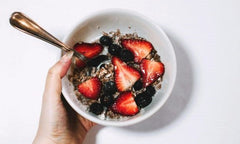PMS afflicts many women today. The symptoms of PMS vary from person to person, and the treatment and improvement methods are also various. By changing daily lifestyle habits such as diet, exercise, and sleep, we aim to improve the hormonal imbalance that causes PMS. In this article, I'll share some of the ways that PMS symptoms are said to improve. PMS is important to balance the mind and body, so it doesn't make sense if stress builds up by overdoing it. Try it while finding a way that is comfortable for you and that you can continue.
Find out in this article
- Are there other ways to treat PMS symptoms other than medication?
- The relationship between diet and PMS
- The relationship between exercise and PMS
- Relationship between lifestyle and PMS
- The relationship between rest and PMS
- The relationship between aromatherapy and PMS
- Relationship between breathing techniques and PMS
[I can understand you in just 3 minutes]
Click here for a free medical interview supervised by a doctor that can be done on LINE
How to improve PMS symptoms?

PMS symptoms are said to be closely related to stress and lifestyle habits. In order to improve physical and mental disorders, it is important to understand the symptoms of your own disorders on a daily basis and to avoid things and actions that are aggravating factors. In addition, it is said that the symptoms of PMS can be improved by diet, exercise, improvement of lifestyle habits, aromatherapy and breathing methods, so let's take a closer look.
meal

The symptoms of PMS are said to be exacerbated by skipping or unbalanced meals, excessive intake of sugary or high-calorie foods, drinking alcohol, and ingestion of caffeine such as coffee and tea. It is said that before menstruation, it is easy to want to eat sweets and increase appetite. A sudden rise in blood sugar due to excessive sugar intake tends to cause a rapid drop afterward, and it is said that hypoglycemia caused by this sudden rise in blood sugar levels may increase irritability and overeating, resulting in aggravation of PMS symptoms. increase. Therefore, avoid skipping meals, eating unbalanced meals, overeating fried foods and sweets, and eating unbalanced meals. Also, it is said that drinking alcohol can exacerbate hypoglycemia and exacerbate PMS symptoms, so be careful not to drink too much before menstruation. 1) Caffeine in coffee and tea is also said to make PMS symptoms worse. Caffeine stimulates nerves, increases irritability and tension, and prevents restful sleep, so avoid excessive intake.
motion

PMS can be very moody and can make you feel heavy and sluggish, so you may not feel like exercising. However, light exercise can be both mentally and physically refreshing, and can improve your metabolism, which can reduce PMS. Aerobic exercise has been confirmed by many studies in the past to help prevent and reduce symptoms of PMS. There are reports that aerobic exercise improved hemoglobin levels, which are indicators of anemia, and that prolactin, a hormone involved in mammary gland development, decreased. It is thought that it is related to the improvement of physical symptoms such as breast enlargement. 2)
adjust one's lifestyle

It is said that PMS can be improved by daily habits . According to a survey on PMS conducted in Japan and overseas, when the presence or absence of PMS symptoms and the characteristics of lifestyle and eating behavior were analyzed, it was found that "I do not eat breakfast every day", "Fried food, drinks containing a lot of sugar, fast food, etc. PMS symptoms were observed in women who had lifestyle habits such as consuming alcohol three or more times a week, exercising less than three times a week, relieving stress by eating, and not getting regular sleep. tended to be 3) 4)
rest

Before menstruation, the secretion of serotonin, a hormone that brings peace of mind and calmness, decreases , making it easier to get irritated and depressed. In addition, the balance of the autonomic nervous system is likely to be disturbed, and the sympathetic nervous system, which makes the body and mind tense, becomes dominant, while the parasympathetic nervous system, which relaxes the mind and body, weakens. In order to keep your mind calm and your autonomic nerves calm, try to keep your body and mind relaxed, and take enough rest and sleep. Healing and massage are good ways to relieve tension in the mind and body.
aromatherapy

Aroma oils used in aromatherapy are said to have calming effects, hypnotic effects, and hormone balance effects. In addition to mental disorders, there are also essential oils that improve physical disorders such as lower abdominal tension, lower abdominal pain, headaches, lower back pain, and swelling. A study conducted on Japanese women in their 20s found that aromatherapy calms the mind and stabilizes the mental state. 5) Furthermore, when examining changes in the autonomic nervous system, which governs the body, using an electrocardiogram, it was confirmed that the aromatic bath lowered the heart rate and increased the activity of the parasympathetic nervous system, resulting in relaxation. There are many types of aroma oils, so it is a good idea to start by relaxing with your favorite scent.
breathing method

Studies have shown that breathing exercises can reduce PMS symptoms and make you feel lighter. There are several types of breathing methods, and it is said that abdominal breathing, inhaling and exhaling through the nose, activates the parasympathetic nervous system, which leads to relaxation. The autonomic nervous system, which regulates the functions of the internal organs of the body, consists of the sympathetic and parasympathetic nerves, and emotions such as frustration and anger are dominated by the sympathetic nerves. We control our emotions by maintaining a balance between these two nerves. Yoga is said to be effective in balancing the autonomic nervous system and reducing symptoms of PMS. It is also said to balance the nervous system.
Also read the following articles
What causes nausea and stomach upset during menopause? Introducing herbal medicines and acupuncture points for coping
Incorporating Chinese herbal medicine may lead to alleviation of various symptoms
Taking herbal medicines is also effective for painful PMS symptoms. Kampo medicine comprehensively reviews various things such as the person's constitution and lifestyle, and gradually improves symptoms from the inside of the body. There are various herbal medicines, but the herbal medicines that are effective for the symptoms of PMS are as follows.
- Kamishoyosan: Depression, irritation, hot flashes, hot flashes, etc.
- Toki shakuyakusan: Tendency to coldness and anemia
- Keishibukuryogan: Hot flashes, headache, lower abdominal pain, etc.
There are individual differences in the symptoms of PMS, and it is necessary to take Chinese herbal medicine that matches the symptoms . Kampo medicine gradually improves the symptoms, so it is easy to incorporate it into your life, so if you want to alleviate the symptoms little by little, please consult your doctor or pharmacist.
▼ You can consult Kampo on LINE
Click here for a free consultation supervised by a doctor
summary
Symptoms of PMS vary from person to person. It's important to find a way to improve it that suits you. First of all, after understanding the symptoms of PMS, review your lifestyle habits such as eating, exercising, drinking, and sleeping, and continue a regular life. Knowing what your symptoms are, how severe they are, and how long they last is also necessary to determine if your symptoms have been alleviated. However, if the symptoms do not improve even after improving your lifestyle, or if the symptoms continue to interfere with your daily life, we recommend that you see a gynecologist.
[I can understand you in just 3 minutes]
Click here for a free medical interview supervised by a doctor that can be done on LINE
References
1) María Del Mar Fernández. Premenstrual syndrome and alcohol consumption: a systematic review and meta 2018 https://pubmed.ncbi.nlm.nih.gov/29661913/
2) J Educ Health Promot. To compare the effects of aerobic exercise and yoga on Premenstrual syndrome.2019 https://www.ncbi.nlm.nih.gov/pmc/articles/PMC6852652/
3) Koichi Shido, Research on premenstrual syndrome and lifestyle among female students of this university - Bulletin of Faculty of Nursing and Social Welfare, Hokkaido University of Health Sciences, No. 11, 2004 https://hsuh.repo.nii.ac.jp/index.php?action=pages_view_main&active_action =repository_view_main_item_snippet&index_id=517&pn=1&count=20&order=17&lang=japanese&page_id=13&block_id=17
4) Shu-Hui Cheng. Factors associated with premenstrual syndrome - a survey of new female university students.2013 https://pubmed.ncbi.nlm.nih.gov/23347812/
5) Noriko Yoshida Study of Aromatherapy Effects on Premenstrual Syndrome 2009 https://amcor.asahikawa-med.ac.jp/modules/xoonips/download.php?id=71K











